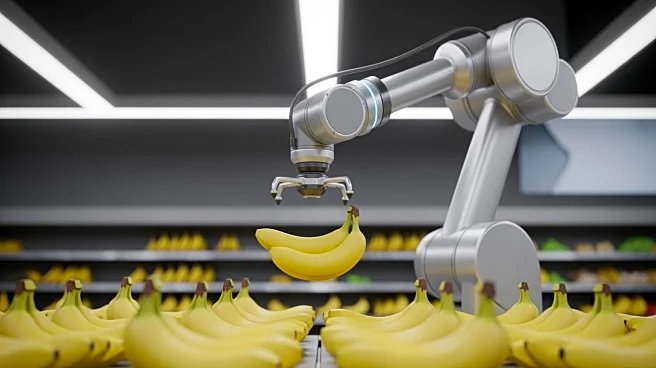What's Happening?
Fresh Del Monte has initiated a pilot program using AI-powered robotic carts named Servi to sell bananas in three suburban Jewel-Osco stores in Chicago. These robots, developed by Bear Robotics, are designed
to navigate busy environments using lidar and cameras. The initiative aims to explore innovative ways to merchandise produce at the retail level. Servi robots follow shoppers around the produce aisle, delivering voice messages and displaying fresh fruit on trays. The pilot program, running through October, seeks to assess consumer reactions and potential sales increases. Early feedback indicates mixed reactions from shoppers, with some amused and others annoyed by the robots' presence.
Why It's Important?
The deployment of robotic carts in grocery stores represents a significant shift towards automation in retail, potentially transforming how consumers interact with products. If successful, this initiative could lead to broader adoption of robotic sales platforms, enhancing efficiency and customer engagement. For Fresh Del Monte, this could mean increased sales and a competitive edge in the produce market. However, the success of such technology depends on consumer acceptance and the ability to effectively integrate robots into existing retail environments. The pilot's outcome may influence future investments in robotic merchandising across the U.S.
What's Next?
The pilot program's results will determine whether Fresh Del Monte expands the use of robotic carts beyond the initial three Jewel-Osco locations. A successful trial could lead to a national rollout, requiring significant investment in a fleet of robotic sales units. Stakeholders, including grocery chains and technology developers, will closely monitor the program's impact on sales and customer experience. Adjustments to the robots' design and functionality may be necessary to address consumer feedback and optimize performance.
Beyond the Headlines
The introduction of robotic carts in grocery stores raises questions about the future of retail jobs and the ethical implications of automation. While robots can enhance efficiency, they may also displace human workers, necessitating discussions on workforce adaptation and retraining. Additionally, the cultural acceptance of robots in everyday life continues to evolve, influencing consumer behavior and expectations.










